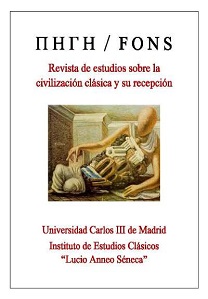Public Reasoning and the Role of Logos in Gorgias and Aristotle
Abstract
This paper focusses on the role of public speech in the process of political deliberation and collective decision-making. Specifically, it pays attention to Gorgias and Aristotle’s reflection on the role of persuasive logos in the domain of public reasoning. The aim of this paper is to examine the common features of Gorgias and Aristotle’s understanding of the human condition and the ways of managing it in the context of social life. Gorgias’ fundamental contribution to this topic can be seen in his Encomium of Helen, a pioneering argument on the power of logos within the human world. On this basis, this paper clarifies the theoretical background of Gorgianic anthropology and highlights its sensitivity to the situational framework of human decision-making. Recognising the essential ambiguity of the human situation in the absence of an absolute measure of human action, sophistry advocates techniques of immanently controlling the world and recognises the key role of rhetoric communication in this process. In this context, Gorgias’ in-depth analysis reveals the power of speech in manifesting the relevant aspects of the situation, grasping current options and encouraging a proper response on the level of deeds. Aristotle can be compared with Gorgias precisely with respect to their shared sensitivity for the situational character of human deliberation and decision-making. Aristotle’s detailed account of individual deliberation in the varying constellations of particular situations (EN III 2-3) at the same time provides a suitable model for public deliberation. On the level of public reasoning, the role of logos becomes prominent again. The logos is effective within the contingent world where the future is uncertain and open to various possibilities. Grasping the optimum while respecting all unique circumstances, including the proper time for collective action that the community should take, defines the public debate. In this context, this paper examines Aristotle’s concept of deliberative rhetoric (Rhet. I 3-4). Special emphasis is placed on the fact that in the case of deliberative speech (unlike forensic speech), Aristotle admits using non-argumentative procedures such as appealing to one’s emotions, etc. His approach suggests that he does not understand political deliberation as an impartial assessment of neutral options, but as an engaged discussion about shared goals and the common good, which is influenced by the emotional attitudes of the interested members of the political community. For Aristotle, public reasoning remains a contest for attention and trust. Exploring these aspects allows evaluating Aristotle’s contribution to managing political reality through persuasive speech.
Downloads
References
Aristotle in 23 Volumes, XVII-XXII, 1926-1989, translated by H. Tredennick, H. Rackham, J.H. Freese, Cambridge (MA)-London.
Aubenque, P. (1963), La prudence chez Aristote, Paris. Czech translation: Aubenque, P. (2003), Rozumnost podle Aristotela, Praha.
Barney, R. (2017), «Gorgias’ Encomium of Helen», in E. Schliesser (ed.), Ten Neglected Classics of Philosophy, Oxford, 1-25.
Bons, J.A.E. (2007), «Gorgias the Sophist and Early Rhetoric», in I. Worthington (ed.), A Companion to Greek Rhetoric, Malden (MA)-Oxford, 37-46.
Classen, C.J. (1981), «Aristotle’s Picture of the Sophists», in G.B. Kerferd (ed.), The Sophists and their Legacy, Wiesbaden, 7-24.
Evelyn-White, H.G. (1914), Hesiod. Theogony. The Homeric Hymns and Homerica. With an English Translation by H.G. Evelyn-White, Cambridge (MA)-London.
Gagarin, M. - Woodruff, P. (eds.) (1995), Early Greek Political Thought from Homer to the Sophists, Cambridge.
Garsten, B. (2009), Saving Persuasion. A Defence of Rhetoric and Judgement, Cambridge (MA)-London.
Kock, Ch. (2014), «Aristotle on Deliberation. Its place in ethics, politics and rhetoric», in H. Van Belle et al. (eds.), Let’s talk about politics. New essays on deliberative rhetoric, Amsterdam-Philadelphia, 13-26.
MacDowell, D.M. (1982), Gorgias. Encomium of Helen. Edited with Introduction, Notes and Translation by D.M. MacDowell, Bristol.
Nieuwenburg, P. (2004), «Learning to Deliberate. Aristotle on Truthfulness and Public Deliberation», Political Theory 32, 4, 449-467.
Oesterreich, P.L. (1994), Philosophen als Politische Lehrer. Beispiele öffentlichen Vernunftgebrauchs, Darmstadt.
Olfert, C.M.M. (2014), «Aristotle’s Conception of Practical Truth», Journal of the History of Philosophy 52, 2, 205-231.
Schiappa, E. (2013), Protagoras and Logos. A Study in Greek Philosophy and Rhetoric, Columbia.
Segal, Ch.P. (1962), «Gorgias and the Psychology of Logos», Harvard Studies in Classical Philology 66, 99-155.
Verdenius, W.J. (1981), «Gorgias’ Doctrine of Deception», in G.B. Kerferd (ed.), The Sophists and their Legacy, Wiesbaden, 116-128.
Yack, B. (2006), «Rhetoric and Public Reasoning. An Aristotelian Understanding of Political Deliberation», Political Theory 34, 4, 417-438.
Se permite que los autores de los artículos y de las discusiones publicados en la revista los reproduzcan en otros sitios siempre y cuando se haga mención de que han sido previamente publicados en ΠΗΓΗ/FONS.




